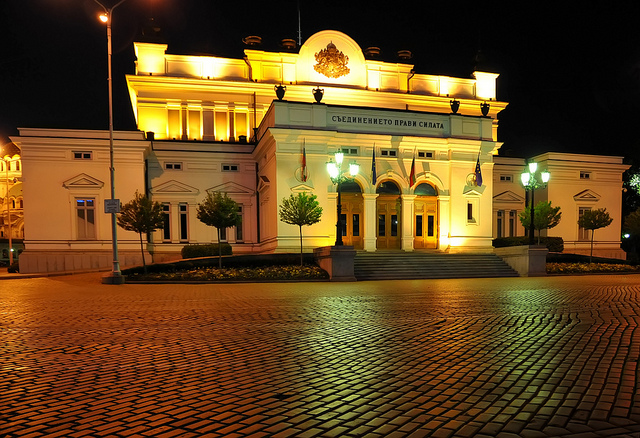Research from Bulgaria shows that in their coverage of elections, the media promote the views of the main contenders
Information presented by the media during election campaign helps voters choose among political contenders and the policy alternatives that they propose. Research, presented here by Petia Kostadinova, on media coverage of election pledges in Bulgaria demonstrates that unlike in established democracies, few of the specific promised made by political parties are reported in the news. Those that are, though, highlight the proposals made by the major political rivals, and also reflect policy issues that are of importance to the majority of voters.

Bulgaria’s parliament (Credit: Dennis Jarvis, CC BY SA 2.0)
The notion that the media is instrumental for the functioning of modern democracies is indisputable, and a growing stream of research demonstrates that it is the main sources of political information for voters, particularly during election times.
These functions are especially relevant in newer democracies, yet this area is under-studied. How successful are the media in conveying information to voters that is relevant to their electoral choices? How well do the media’s messages reflect the policy priorities of political parties? How likely is it that issues that are politically important and societally salient are among those highlighted by the media during election campaigns? A recent study, examining the election pledges made by 15 political parties elected to the National Assembly in Bulgaria during the period 1990-2009, sheds some light on those questions.
Assessing which of the 3,083 election pledges made by parties subsequently elected to the legislature were also published by any one of six major print outlets, the study reaches a number of conclusions. Unlike in established democracies, only around 13% of party promises are reported by the print media, including general news dailies, specialised economic outlets, and party newspapers. These low numbers imply that much can be wished with respect to the amount of policy-relevant information that media provide to voters during election campaigns. Yet, the low overall share of pledges reported by the media could in part be attributed to the multitude of short-lived political parties that were present in Bulgaria’s politics during the period of study, and whose election promises were printed in the news at very low rates, if at all. Compared to such parties, on average, promises made by political groups with more consistent presence in legislature were more visible in the media. The variation with respect to what share of pledges were printed in the media also has a temporal component: unlike news reports during the first two competitive elections, over time, print media in the country reported a greater share of election promises. The number of pledges printed in the media was especially high during the 2001 election campaign.
Further, a detailed analysis of the factors that help explain why some pledges were printed in the news, while others – were not, tells a more complex story. Pledges made by parties that formed the outgoing government were less likely to be reported in the media, contradicting results from other studies such as on Poland and Sweden. However, election promises made by the main contenders during a given election campaign were more than three times more likely to be published in newspapers, compared to pledges by other parties, results that are consistent with studies of Ireland, for example. In the Bulgarian context, the main political rivals during a campaign often represented the challengers to the sitting government, and did not include a party holding office. There is little variation in these results between types of newspapers, general news or specialised economic outlets.
In selecting which pledges to report, the media in Bulgaria also show a preference for those that address policies relevant to large segment of the population (such as economic affairs) although not the more complex and highly specific issues of economic reform. This finding applies to any pledge on economic policy made by any political party, and is not specific to the ideological profile of the party. In other words, pledges to expand government made by parties on the left, or promises to cut government made by parties on the right, are no more likely to be published in the media than other types of pledges made by the same parties. In this sense, media in Bulgaria are less likely to help voters associate a given political party with a particular left-right ideological position.
Results of the first study of how media in a post-communist democracy report specific election promises made by parties elected to the legislature, have important implications. High electoral volatility resulting in frequent changes in legislative composition has led to a relative neglect by the media of what parties, especially the smaller ones, actually promise at election times. Such parties will have to work harder to get their messages across to the public, and further research is needed to ascertain whether media report any pledges have impact on voters, or on subsequent government policies.
Further, conclusions that media do not favour the promises made by the outgoing government parties are much welcome in a country with declining media freedom and strong linkages between parties and media moguls. The weak correspondence between parties’ ideological agenda and media reports, while in conflict with normative and empirical expectations, is another possible sign of media independence. Similarly encouraging are the findings that media tend to publish pledges made by the main contenders, and thus projected winners, of each election. Such conclusion is in line with the expectation that media play an important role in facilitating the linkage between parties and voters, and by providing information to voters it helps them distinguish among competing policy alternatives.
While admittedly an important one, the media’s role in a democracy, through the specific mechanisms that it affect party choice, voters, and subsequently, policy outcomes, remains a neglected area of research in the post-communist countries. By presenting the results of the first study of the extent to which media report election pledges in Bulgaria, and what factors explain this variation, this study links a broad theoretical literature and empirical work on western democracies, with original data from a transitioning society, inspiring many questions for future research.
—
For more information on this topic, see the author’ recent article in Party Politics. This post represents the views of the authors, and not those of Democratic Audit or the LSE. Please read our comments policy before posting.
—
 Petia Kostadinova is an Assistant Professor in the Department of Political Science at the University of Illinois, Chicago. Her research focuses on examining questions mandate responsiveness of political parties, including the role of media in this process, as well as on issues of governance in the European Union. https://www.petiakostadinova.net
Petia Kostadinova is an Assistant Professor in the Department of Political Science at the University of Illinois, Chicago. Her research focuses on examining questions mandate responsiveness of political parties, including the role of media in this process, as well as on issues of governance in the European Union. https://www.petiakostadinova.net





 Democratic Audit's core funding is provided by the Joseph Rowntree Charitable Trust. Additional funding is provided by the London School of Economics.
Democratic Audit's core funding is provided by the Joseph Rowntree Charitable Trust. Additional funding is provided by the London School of Economics.
Research from Bulgaria shows that coverage of elections promote the views of the main contenders https://t.co/SUOkRhqEPT @democraticaudit
Research from Bulgaria shows that in their coverage of elections the media promote the views of the main contenders https://t.co/bzqp8hn1es
Research from Bulgaria shows that in their coverage of elections, the media promote the views of the main contenders https://t.co/Zk2R22T2Uy
Research from Bulgaria shows that in their coverage of elections, the media promote the views of the main contenders https://t.co/9DmV1JqhqR
Research from Bulgaria shows that in their coverage of elections, the media promote the… https://t.co/d8aH23o3IW https://t.co/gwZGNboYlF